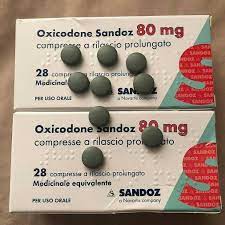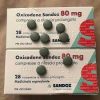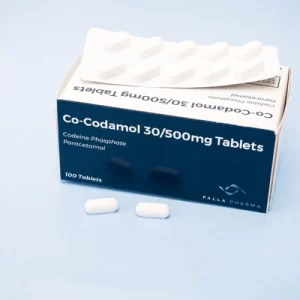Oxycodone 80mg is an opioid medication that is used for the relief of moderate to severe pain and has been found to improve the quality of life for those with many types of pain. Oxycodone is a semisynthetic opioid derived from thebaine, an opioid alkaloid found in the Persian poppy and one of the many alkaloids found in the opium poppy. Oxycodone was developed in 1917 in Germany as one of several semisynthetic opioids in an attempt to improve on the existing opioids.
Indications
- Swallow OXYCODONE tablets whole with a full glass of water or other fluid.
- Do not break, chew, crush, or dissolve the tablets. This medicine was designed to work correctly only if swallowed whole. They may release all their contents at once if broken, chewed, crushed, or dissolved, resulting in a risk of overdose or even death.
- Take this medicine as directed by your doctor. Oxycodone should be taken every twelve hours.
- Take your tablets when you have been told to do so. If, however, you begin to experience pain (breakthrough pain) while taking your Oxycodone tablets as prescribed, contact your doctor, as your dosage may have to be reviewed.
- This medicine must be taken regularly to control the pain. Taking this medicine at regular intervals prevents the onset of pain. This medicine should not be taken when you feel you need it, as this will cause some discomfort.
- Do not take any alcohol while you are being treated with Oxycodone.
Contraindications
Do not take Oxycodone if you have an allergy to oxycodone hydrochloride or any other similar medicines known as opioid analgesics, e.g., morphine or codeine.
Some of the symptoms of an allergic reaction may include:
- Shortness of breath
- Wheezing or difficulty breathing
- Swelling of the face, lips, tongue, or other parts of the body, rash, itching, or hives on the skin.
- Do not take Oxycodone if you are taking a medicine for depression called monoamine oxidase inhibitor or you have taken any in the last two weeks
- You have just drunk a large amount of alcohol, regularly drunk large amounts of alcohol, or have confusion and shaking due to stopping drinking alcohol
- You are about to have an operation, including surgery on your spine for pain relief, in the next 24 hours or have had an operation within the last 24 hours
- You have been given the 80mg strength and have not used any opioid medicine before.
Possible side effect
Tell your doctor as soon as possible if you do not feel well while you are taking Oxycodone.
Oxycodone helps most people with moderate to severe pain, but it may have unwanted side effects in some people. All medicines can have side effects. Sometimes, they are serious, but most of the time, they are not. You may need medical attention if you get some of the side effects.
Do not be alarmed by the following lists of side effects. You may not experience any of them.
Tell your doctor or pharmacist if you notice any of the following. They worry about mild abdominal problems, such as diarrhea, feeling sick (nausea), loss of appetite or constipation, muscle problems such as spasms or twitching or tremors, sore throat, dry mouth, hiccups, trouble swallowing or voice changes, excessive sweating, skin rash, itching, fever, chills or sweating feeling anxious or nervous, trouble sleeping or abnormal dreams trouble with your balance new problems with your eyesight swelling of legs or ankles. The absence of menstrual periods is essential.
The below list includes serious side effects that may require medical treatment
- You have an allergic reaction: shortness of breath, wheezing, shallow or difficult breathing
- Swelling of the face, lips, tongue, throat, or other parts of the body
- Rash, itching, or hives on the skin
- Seizures, fits or convulsions
- Fast or irregular heartbeats
- Chest pain or chest tightness
Interactions
Some medicines and OXYCODONE may interfere with each other. These include:
- Medication for depression, psychiatric or mental disorders
- Medicines to treat depression belonging to a group called monoamine oxidase inhibitors must be stopped 14 days before Oxycodone tablets are taken
- Medication to help you sleep
- Medicines to put you to sleep during an operation or procedure
- Medicines to relax your muscles
- Medicines to lower blood pressure
- Quinidine and other medicines to treat the heart
- Cimetidine, a medicine to treat stomach ulcers or heartburn
- Medicines to relieve stomach cramps or spasms, prevent travel sickness, or to treat Parkinson’s disease
- Medicines to treat urinary incontinence
- Medicines to stop nausea or vomiting, e.g., metoclopramide
- Ketoconazole, a medicine to treat fungal infections
- Ritonavir, an antiviral medication
- Macrolide antibiotics, e.g., clarithromycin, rifampin
- Medicines used to treat epilepsy, e.g., carbamazepine, phenytoin
- Medicine to treat HIV infection and AIDs, e.g., ritonavir
- Alcohol
- Grapefruit juice
- Medicines to thin the blood, e.g., coumarin derivatives such as warfarin
These medicines or alcohol may be affected by Oxycodone or may affect how well it works. They may increase the side effects of Oxycodone. You may need different amounts of your medicines, or you may need to take different medicines.
Precautions
Oxycodone contains lactose. If your doctor has told you that you are intolerant to some sugars, tell your doctor before taking it. If you have not told your doctor about any of the above, tell them before you start taking Oxycodone.
Pregnancy and Breastfeeding
Do not take Oxycodone 80mg if you are pregnant or intend to become pregnant. It may affect your developing baby if you take it during pregnancy.
OXYCODONE is not recommended to be taken during labor. Oxycodone given to the mother during labor can cause breathing problems in the newborn.
Tell your doctor if you are breastfeeding or plan to breastfeed. Your doctor can discuss the risks and benefits with you.
Do not drive or operate machinery until you know how Oxycodone affects you.
Oxycodone may cause drowsiness, dizziness, hallucinations, disorientation, blurred vision, or other vision problems and may also affect alertness. Discuss these aspects and any impact on your driving or operating machinery with your doctor. Make sure you know how you react to this medicine before driving a car, operating machinery, or doing anything else that could be dangerous if you are drowsy, dizzy, or not alert.
Low sex hormone levels
Long-term use of Oxycodone tablets may result in a decrease in sex hormone levels, which may affect sperm production in men and the menstrual cycles in females. Talk to your doctor if you have concerns.
Missed dose
If you forget to take a dose, contact your doctor for advice. Do not take a double dose to make up for the missed dose. This may increase the chance of you getting an unwanted side effect.
Overdose
In high doses, overdoses, or in some persons not tolerant to opioids, oxycodone can cause:
- Shallow breathing
- Slowed heart rate
- Cold/clammy skin
- Pauses in breathing
- Low blood pressure
- Constricted pupils
- Circulatory collapse
- Respiratory arrest and death
Oxycodone overdose has also been described to cause spinal cord infarction in high doses and ischemic damage to the brain due to prolonged hypoxia from suppressed breathing.
Storage
Store Oxycodone 80mg at room temperature between 68-77 degrees F (20-25 degrees C) away from light and moisture. Do not store the drugs in the bathroom. Keep all drugs away from the reach of children and pets.







Reviews
There are no reviews yet.